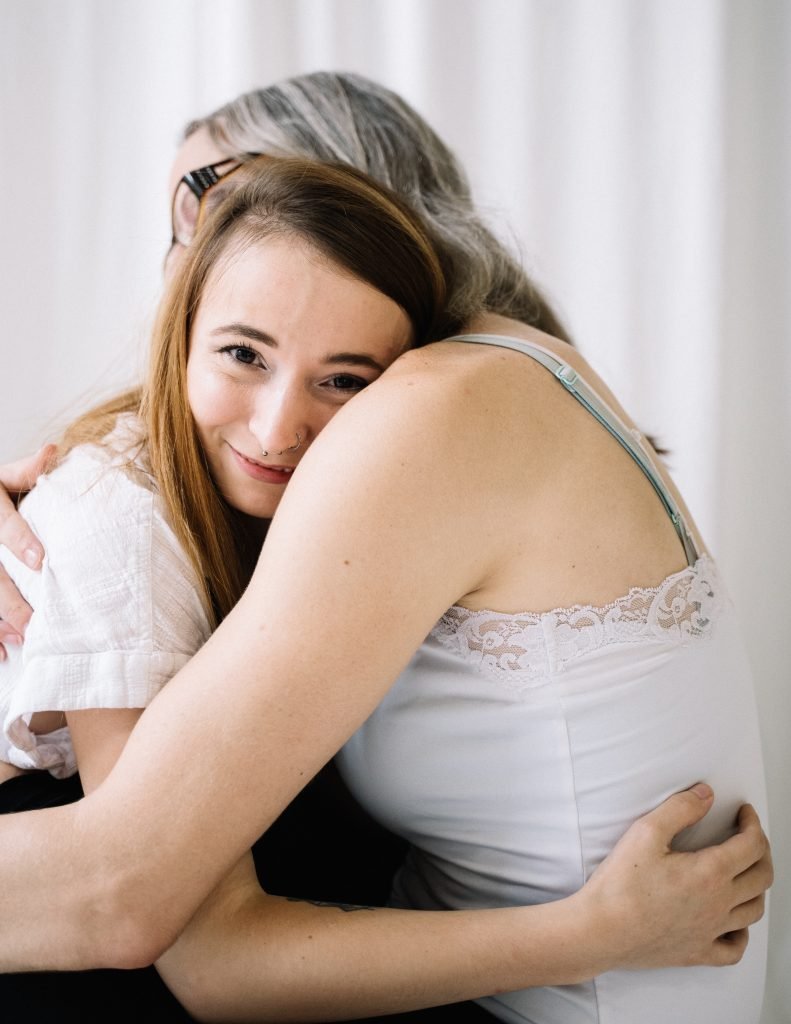Parenting a neurodivergent child can be hard on so many fronts, however as a mum, even though there are challenging moments, in most cases, it is not my children I find hard.

Most of the challenges that I face as a neurodivergent parent of neurodivergent children are systemic.
You see, the world, the medical system, the mental health system, the education system, the way that we are taught to parent our children and our society’s definition of success, were not created with neurodivergent people in mind.
It is the deep inner work – the unrooting of my internalised ableism, the constant reparenting of myself, the unlearning and fighting against the behaviourist way I was parented and taught to parent I find hard.
It is adapting how I do things as a parent, because I know that this is what is required to meet the needs of my children, and then second-guessing myself (because in many ways I am pioneering a new way for my family) that I struggle with.
It is the sheer amount of energy I expend in advocating for myself and my children with other people and organisations only to be dismissed and invalidated that I find challenging.
It is how other people interact with my children in a way that causes them to feel like they are somehow ‘less than’ that breaks my heart.
And it is the loss of control (that I know was just an illusion, but still…) that I find the hardest to let go of.
After all, our whole lives we have been fed a formula – act a – expect b.
However, I am coming to accept what most parents of neurodivergent children learn throughout their parenting journey – there is no formula and there is no control.
It can be terrifying!
What Is Radical Acceptance?
Radical acceptance has been both a lifeline and my biggest challenge as a parent over the years.
Acceptance is something that all children and teens need from their parents. We cannot form an authentic connection with someone when we sense that they are trying to change us to become who they think we should be. And I know too, that putting this into practice can be some of our hardest work as parents because of how we were raised. Especially if like me you have been conditioned by trauma to be hypervigilant for the other shoe to drop.
Radical acceptance comes from a Buddhist practice of being able to accept situations outside of our control with non-judgement.
The word ‘radical’ comes from the Latin radic-, radix, meaning “root“. This definition indicates to us that in order to practice acceptance we need to examine things from the ‘roots’.

This practice teaches us that the ‘root’ of our suffering is not the circumstance we find ourselves in but rather our attachment to our belief about what is happening.
For example, if my ‘root’ belief is that parenting should be easy and I encounter behaviour from my child that opposes this belief then it is not my child’s behaviour that is causing me to suffer but rather my belief that parenting should be easy.
But I get it, man, we can be so attached to these beliefs!
Like anything that is ‘rooted in’ these beliefs can be so hard to let go of. The thing is, the more ‘root bound’ the belief, the more we will suffer.
This practice encourages us to look at the root of our suffering – what we can control and what is outside of our control.
In most cases, the only thing we can truly control is our beliefs and how we respond. However, most of us expend our energy worrying about and trying to control all of the things that are outside of our control and this causes us stress, worry, anxiety and even depression.
The Child We Were ‘Supposed’ To Have
One of the most ‘root bound’ beliefs that keep us the most stuck in suffering is the belief around the child we were ‘supposed to have‘ or the parenting experience we were ‘supposed’ to have. We can get so lost in how unfair life is and how it should have been different, or how it should be so much easier, or how it should be so much better…
In these moments it can feel like we are victims – as if life is happening to us. Our situation can feel utterly hopeless and really personal.
I must admit I am not impervious to the grief that so many parents experience. The grief that shows up as I am prompted to let the ‘Hallmark ideal’ of what family life ‘should look like’ die. I am human, this hurts and I struggle with this too from time to time. I know that I am not alone in this.
There is also so much pressure on parents of neurodivergent children to ‘help’ their children with interventions or therapies to help them ‘fit in’ and make our children’s lives ‘easier’ by teaching them to act in a more neurotypical way.
Is your child or teen in burnout? Do you need support for your family? Check out Autistic Burnout Care and Recovery

In times like this, I find it helpful to remind myself that these are an echo of the predominant messages from my culture and that I know my children best.
But I acknowledge how difficult it is to fight against the deeply rooted ‘unwritten rules’ of what we need to do to ‘fit in’, how we are supposed to be – how our children are supposed to be. The narrowly defined prerequisites of what successful parenting should look like, none of these were created with neurodivergent children or families in mind.
These are just made-up constructs. Constructs that cause me to think that I am doing something wrong or that there is something wrong with my kids when our reality does not live up to these expectations.
I have come to realise that when I focus on holding on to this ‘root bound’ construct I suffer the most. Not only this but I miss out on noticing how amazing my children are just as they are. I also block opportunities to genuinely connect with my children in an authentic way.
After all, as the saying goes – where our focus goes our energy flows. I have found that we have to learn to remove ourselves and our children from the container of this ‘root bound’ construct so that we can bring fresh sustenance into our families.
We first have to let go of the child that our culture led us to believe that we ‘should’ have so that we can accept and love the child we have.
Tanya Valentin
Points For Reflection
I invite you to take a moment here to think about yourself and the culture you were raised in.
- What was communicated to you as a child (explicitly and subtly) about what it meant to be a ‘good child’?
- What was communicated to you (explicitly and subtly) about what it meant to be a ‘good person’?
- What was communicated to you (explicitly and subtly) about what it meant to be a ‘good parent’?
- What are your beliefs about what it means to have a ‘good’ or ‘healthy’ family life?
- How did/does the culture (family influences, teachers, books, television shows, movies, social media etc.) that you live in reinforce these messages?
- How many of your deep ‘rooted’ beliefs about parenting were your idea? How many of your beliefs are just messages that you heard from others and never thought to question?
- What do you need to heal or let go of in order to practise more acceptance of yourself and your child?
Why Radical Acceptance Is Important When Parenting Neurodivergent Children And Teenagers
When it comes to parenting your neurodivergent child/children radical acceptance means choosing to let go of what you have been taught to believe parenting or your expectations or what child ‘should’ look like and choosing to parent in a way that works for you and your family.
Divergent in its very definition means to be different or to walk a different path. So it makes sense that doing things differently is going to be the best thing for us and our children.
The reality of raising neurodivergent children is that you are going to have to let go of many of the parenting ‘rules’ we have been taught by our culture and write new ‘rules’ that fit you and your family. You will also need to let go of your expectations of who your children were meant to be or how they ‘should behave’.

Is your child or teen in burnout? Do you need support for your family? Check out Autistic Burnout Care and Recovery
Is it easy? Most times no.
These systemic beliefs are deeply ‘rooted’ in our societal beliefs and values. You might find yourself at the receiving end of at best well-meaning unsolicited advice and at the worst harsh judgements and even official ‘safe-guarding’ procedures because many in our ablest cultures will not understand. I know that this can be hard, however, many parents notice that their family life is calmer and they and their children do better when they can practice radical acceptance.
It is a sad reality that our children are going to learn from their teachers, peers, media and even family members that who they are is ‘wrong’. (It is estimated that neurodivergent children receive approximately 20000 negative or corrective messages about themselves by age 10 and this has serious implications for their mental health) They need a ‘safe haven’, a person who is going to love, accept and accomodate them for who they are.
I mean, we all know that our children do better when they feel genuinely safe, seen, heard, accepted and loved for who they are and we adapt our approach to meet the needs of our children rather than holding onto who ‘they should be’ or what they ‘should be doing‘.
What Does Radical Acceptance Look Like In Practice?
As a parent of neurodivergent children here are some of the things you may need to practice radical acceptance with:
- Accepting your or your child’s Autism or ADHD diagnosis and all the joys and challenges that this brings.
- Accepting where your child is at and not comparing them to other children or your or other people’s ideas of where they should be in their development.
- Allowing your child to spend the majority of their time at home in their ‘safe space’ which is more than often their rooms.
- Letting go of family meals around the dinner table as these are too overwhelming for your child’s (or other family member’s) sensory needs.
- Changing plans last minute and letting people down because your child or family is in crisis.
- Saying no to family or social events because it causes your child to become too dysregulated.
- Understanding and acceptance of my child’s meltdowns/shutdowns.
- Accepting and understanding that family holidays might look different for your family compared to other families.
- Accepting and understanding your child’s Autistic or ADHD traits and not viewing them as ‘bad behaviour’.
- Embracing technology and ‘screen time’ as a tool to help your child regulate their nervous systems.
- Accepting and understanding that your child’s ‘best’ might look different to your expectations and may also vary from day to day.
- Letting go of your concepts of ‘rewards’ and ‘punishments’ for ‘good’ or ‘bad’ behaviour.
- Accepting and understanding your child’s capacity to attend school.
- Accepting your child’s intellectual difficulties or delays.
- Accepting that family members, teachers and others may not understand your child’s behaviour or your parenting approach but that this doesn’t make your child or your parenting ‘wrong’.
- Accepting that your child, you or your family may need to have therapy or ask for help from medical or allied health professionals.
- Accepting and forgiving yourself for the trauma you may have caused your children pre their (or your own) diagnosis.
- Accepting and understanding that some days you will need to let go of your expectations of what ‘healthy meals’ look like and you will just have to go with the flow.
- Accepting and understanding that some days just keeping everyone alive constitutes ‘good parenting’.
These are just a few things from a very long list of things that so many parents of neurodivergent children will need to practice radical acceptance with. If you are neurodivergent yourself you may find yourself needing to practice some radical acceptance with yourself too.
Is your child or teen in burnout? Do you need support for your family? Check out Autistic Burnout Care and Recovery

How To Practice Radical Acceptance
Like any new skill radical acceptance takes time and patience to learn. It is normal for our capacity for radical acceptance to change from moment to moment day to day and for it to feel really hard at times.
- The first step like any learning or healing journey is awareness. We cannot change things that we are not aware of. The best tool that we have for creating awareness is our attention. Pay careful attention to your thinking especially when you use the word ‘should’. I find that anytime I ‘should’ myself, someone else or a situation there is a ‘root’ belief behind the thinking that needs digging up.
- The second step is to approach this awareness with curiosity. Ask yourself – “What is my expectation of what should be happening here and how does it differ from my reality?” “What ‘root’ belief is sitting behind this ‘should’?” “Is it something I truly believe or is it something I have been conditioned to believe by someone else.” Be careful not to be critical of yourself or hard on yourself here. Remember we all have ‘root’ beliefs that keep us stuck.
- The third step is to examine how this ‘root’ belief makes you feel and act towards others or shows up in your parenting. Be careful to just be curious here – this is not the time to be hard on yourself.
- Step four is to ask yourself – “Who or how would I be as a parent if I could let this ‘root’ belief go?”
- The final step is to ask yourself how you can accept the reality of the situation I am ‘shoulding’. It is important to remember that accepting reality does not mean that you agree with the situation or that you have to let go of how you feel about it. It just means that you accept that this is the reality of what is going on right now – that’s all.
When we are able to accept reality (what is happening in the present moment) we stop expending energy fighting against reality. It doesn’t mean that we can’t feel sad, angry or frustrated or that we give up hope that our reality might eventually change.
It just means that we stop fighting reality and we refocus our attention and energy on the present moment and what we can do now instead of reliving the past or worrying about the future.
When you argue with reality, you lose— but only 100% of the time.
Byron Katie
If you would like some help working on your beliefs about parenting and adapting your parenting approach to meet the needs of your Autistic or ADHD child I am here to help. CLICK HERE Book a FREE 30-minute call with me to get support.

How To Create A New Belief So That We Can Practice More Radical Acceptance In Our Lives?
Once we have done the work on our belief we then need to change our language about it.
I might be going against the grain here but we can’t simply ‘let go’ of a belief, it is impossible. We have to replace our old beliefs with a new one.
This might take some time and reflection, but ask yourself, “What would be a more compassionate, nurturing, flexible or empowering belief?”
A helpful tip is to review your values. Can you think of a new belief that better suits your values?
For example, if ‘family’ is one of your core values then how can you adapt your belief about parenting to better meet the needs of your neurodivergent child and to align with this value?
Remember that the old belief had a complex ‘root system’ and will have left a big hole. It will take time, patience and nurturing of your new belief (that is only in seed form) for it to take root and flourish.
You may also need to tend your ‘mind garden’. Sometimes when we dig up a ‘root’ belief, depending on how prolific it was we can leave bits of ‘root’ in the ‘soil’ of our consciousness and this can grow into new smaller plants from time to time.
One way that you can nurture this seed is by creating affirmations or mantras that you can say to yourself when parenting or radical acceptance feels hard.
My favourites are:
- It is what it is.
- I am doing the best I can.
- Just because it feels hard doesn’t mean that I am doing it wrong.
- I know my child/family best, and I can trust myself.
- Others don’t need to understand or approve of me in order for me to do what is best for myself and my child.
If you would like some help working on your beliefs about parenting and adapting your parenting approach to meet the needs of your Autistic or ADHD child I am here to help. CLICK HERE Book a FREE 30-minute call with me to get support.

How Connection-Focused Parenting Can Support You To Have More Radical Acceptance In Your Parenting
Radical acceptance is one of the fundamental principles of a parenting approach called connection-focused parenting. Connection-focused parenting is a strengths-focused parenting approach that sees both parents and children through the lens of unconditional positive regard.
This style of parenting that emphasizes connection makes building your relationship the focus of your interactions with your child. This in turn will equip your child with a sturdy foundation of self-acceptance, self-worth and resilience.
A child or teenager who has a strong sense of connection with a parent is more likely to cooperate because of the love and trust that is established between the parent and the child. The resulting feelings of belonging create an emotional environment where our children and teenagers can develop compassion and empathy and learn to care about the impact of their behaviours on others intrinsically.

Connection-Focused Parenting For Neurodivergent Children and Teenagers Prioritises Four Things:
- Secure attachment with a significant adult.
- Affirming your child or teen’s Neurodivergent identity.
- Connection before correction, ‘fixing’ or advice-giving.
- Adapting your parenting approach to your child or teen’s unique needs, strengths and difficulties.
A Community Of Cycle Breakers
If you read this blog and this has triggered an emotional reaction in you or this blog has highlighted areas in your parenting that you want to change please know that you are not a bad person and you are not a parent.
We can only (every single one of us) ever do the best with the tools that we have.
When we have new tools we do better.
As a fellow parent and as a family coach, I know one thing for certain about you.
If you are here reading this blog and are contemplating a change you, my friend, are an extraordinary human being. You are a brave, courageous cycle breaker, ready to dig deep and do the work to heal generations of trauma for yourself and your kids.
This is not something that is easily done or for the faint-hearted. However, it is some of the most important work you will ever do for yourself and your family.

Did you find this blog helpful? Make sure to subscribe to this blog
Meet The Person Who Wrote This Blog

Tanya Valentin is an AuDHD person, mum of three, family coach, author and podcaster.
Tanya is an educator/coach with 25 years of experience working with children and families. She specialises in guiding parents of Autistic & ADHD children and teens through burnout recovery.
She is the founder of the Autistic Burnout Care and Recovery program for parents and the host of the Parenting Neurodivergent Kids Together podcast.
Tanya’s work combines education, emotional support, and practical strategies, reflecting her commitment to helping families create sustainable, connected relationships during difficult times.
Need support? Book a FREE 30-minute call with Tanyaya
